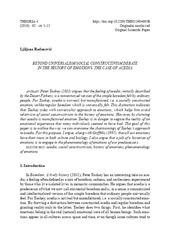Приказ основних података о документу
Prevazilaženje univerzalizma i socijalnog konstruktivizma u istoriji emocija - slučaj akedije
Beyond universalism/social constructivism debate in the history of emotions: The case of acedia
| dc.creator | Radenović, Ljiljana | |
| dc.date.accessioned | 2021-10-12T12:55:59Z | |
| dc.date.available | 2021-10-12T12:55:59Z | |
| dc.date.issued | 2019 | |
| dc.identifier.issn | 0351-2274 | |
| dc.identifier.uri | http://reff.f.bg.ac.rs/handle/123456789/2750 | |
| dc.description.abstract | Piter Tuhi (2011) smatra da je osećanje akedije koje su prvobitno opisali Pustinjski oci romantizovana verzija obične dosade koju svi osećamo. Za Tuhija akedija nije stvarna, već je proizvedena, tj. socijalno konstruisana emocija, za razliku od dosade koja je osnovna i univerzalna. Tuhi zastupa univerzalistički pristup osnovnim emocijama a konstruktivistički pristup izvedenim emocijama, što mu pomaže da izbegne relativizam socijalnog konstruktivizma u istoriji emocija. Međutim, tvrdeći da je akedija socijalni konstrukt Tuhi negira realnost emocionalnog iskustva za koje mnogi ljudi tvrde da je stvarno. Cilj ovog rada je da ukaže na način na koji možemo da prevaziđemo nedostatke Tuhijevog pristupa akediji i sličnim emocijama. U tu svrhu, zajedno sa Grifitsom (1977) tvrdim da sve naše emocije imaju koren i u kulturi i u biologiji. Takođe, argumentujem da je zadatak istoričara da se bavi fenomenologijom emocija naših predaka. | SR |
| dc.description.abstract | Peter Toohey (2011) argues that the feeling of acedia, initially described by the Desert Fathers, is a romanticized version of the simple boredom felt by ordinary people. For Toohey, acedia is not real, but manufactured, i.e. a socially constructed emotion, unlike regular boredom which is universally felt. This distinction indicates that Toohey sides with universalist approach to emotions, which helps him avoid relativism of social constructivism in the history of emotions. However, by claiming that acedia is manufactured emotion Toohey is in danger to negate the reality of an emotional experience that many individuals seemed to have had. The goal of this paper is to outline the way we can overcome the shortcomings of Toohey's approach to acedia. For this purpose, I argue, along with Griffiths (1997), that all our emotions have their roots in both culture and biology. I also argue that a job of a historian of emotions is to engage in the phenomenology of emotions of our predecessors. | EN |
| dc.publisher | Srpsko filozofsko društvo, Beograd | |
| dc.rights | openAccess | |
| dc.source | Theoria | |
| dc.subject | socijalni konstruktivizam | SR |
| dc.subject | istorija emocija | SR |
| dc.subject | fenomenologija emocija | SR |
| dc.subject | akedija | SR |
| dc.subject | social constructivism | EN |
| dc.subject | phenomenology of emotions | EN |
| dc.subject | history of emotions | EN |
| dc.subject | acedia | EN |
| dc.title | Prevazilaženje univerzalizma i socijalnog konstruktivizma u istoriji emocija - slučaj akedije | SR |
| dc.title | Beyond universalism/social constructivism debate in the history of emotions: The case of acedia | EN |
| dc.type | article | |
| dc.rights.license | ARR | |
| dc.citation.epage | 15 | |
| dc.citation.issue | 4 | |
| dc.citation.other | 62(4): 5-15 | |
| dc.citation.rank | M24 | |
| dc.citation.spage | 5 | |
| dc.citation.volume | 62 | |
| dc.identifier.doi | 10.2298/THEO1904005R | |
| dc.identifier.fulltext | http://reff.f.bg.ac.rs/bitstream/id/1431/2747.pdf | |
| dc.type.version | publishedVersion |

